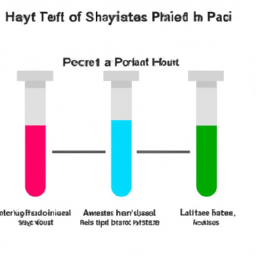Blood, Stool, and Breath tests on H Pylori, which one goes more accurate?

About Helicobacter pylori (H. pylori) Infection
2023-03-02
In One Single Text explain You Why Helicobacter Pylori Prone to Reinfection? and Helicobacter Pylori Reinfection Related Issuess
2023-03-04Blood, Stool, and Breath tests on H Pylori, which one goes more accurate?

Blood, Stool, and Breath tests on H Pylori, which one goes more accurate?
-
Table of Contents
“Accuracy Matters: Find Out Which Test is Best for H Pylori – Blood, Stool, or Breath!”
Introduction
H. pylori is a type of bacteria that can cause infection in the stomach and small intestine. It is estimated that up to two-thirds of the world’s population is infected with H. pylori. Diagnosis of H. pylori infection is usually done through blood, stool, and breath tests. Blood tests are the most commonly used method for diagnosing H. pylori infection, but stool and breath tests can also be used. Each of these tests has its own advantages and disadvantages, and it is important to understand which test is the most accurate for diagnosing H. pylori infection. In this article, we will discuss the accuracy of blood, stool, and breath tests for diagnosing H. pylori infection and which one is the most accurate.
Examining the Patient Experience of Blood, Stool, and Breath Tests for H Pylori
The diagnosis of Helicobacter pylori (H. pylori) infection is typically based on the results of a blood, stool, or breath test. While these tests are essential for the accurate diagnosis of H. pylori, they can also be a source of anxiety and discomfort for patients. This article will examine the patient experience of blood, stool, and breath tests for H. pylori.
Blood tests for H. pylori are typically done through a blood draw. The patient’s blood is then tested for the presence of antibodies to H. pylori. This test is relatively quick and painless, and the results are usually available within a few days.
Stool tests for H. pylori involve collecting a sample of the patient’s stool and testing it for the presence of H. pylori bacteria. This test is more invasive than a blood test, as it requires the patient to collect a sample of their own stool. The results of this test are usually available within a few days.
Breath tests for H. pylori involve drinking a solution containing a special type of sugar and then breathing into a bag. The breath sample is then tested for the presence of H. pylori bacteria. This test is relatively quick and painless, and the results are usually available within a few hours.
Overall, the patient experience of blood, stool, and breath tests for H. pylori can vary depending on the individual. While these tests are essential for the accurate diagnosis of H. pylori, they can also be a source of anxiety and discomfort for some patients. It is important for healthcare providers to be aware of this and to provide support and reassurance to patients who may be feeling anxious or uncomfortable about undergoing these tests.
Exploring the Cost-Effectiveness of Blood, Stool, and Breath Tests for H Pylori
The Helicobacter pylori (H. pylori) bacterium is a common cause of gastrointestinal infections, and can lead to serious health complications if left untreated. As such, it is important to accurately diagnose H. pylori in order to provide effective treatment. Currently, there are three primary tests used to diagnose H. pylori: blood tests, stool tests, and breath tests. Each of these tests has its own advantages and disadvantages, and it is important to consider the cost-effectiveness of each test when determining which is best for a given patient.
Blood tests are the most commonly used method for diagnosing H. pylori. These tests measure the presence of antibodies in the blood that are produced in response to the H. pylori bacterium. Blood tests are relatively inexpensive and can be performed quickly, making them a cost-effective option for diagnosing H. pylori. However, they are not always accurate, and false positives and false negatives can occur.
Stool tests are another option for diagnosing H. pylori. These tests measure the presence of antigens in the stool that are produced by the H. pylori bacterium. Stool tests are more accurate than blood tests, but they are also more expensive and take longer to perform.
Finally, breath tests are used to diagnose H. pylori. These tests measure the presence of a specific type of carbon dioxide in the breath that is produced by the H. pylori bacterium. Breath tests are the most accurate of the three tests, but they are also the most expensive and take the longest to perform.
In conclusion, each of the three tests used to diagnose H. pylori has its own advantages and disadvantages. Blood tests are the most cost-effective option, but they are not always accurate. Stool tests are more accurate, but they are also more expensive and take longer to perform. Finally, breath tests are the most accurate, but they are also the most expensive and take the longest to perform. Ultimately, the best test for a given patient will depend on their individual circumstances and the cost-effectiveness of each test.
Comparing the Accuracy of Blood, Stool, and Breath Tests for H Pylori: A Review of the Evidence
The accuracy of blood, stool, and breath tests for the detection of Helicobacter pylori (H. pylori) infection has been the subject of much debate in the medical community. This review of the evidence aims to compare the accuracy of these three tests in order to provide a better understanding of their relative effectiveness.
Blood tests for H. pylori are the most commonly used diagnostic tool. These tests detect the presence of antibodies to the bacteria in the blood, and are generally considered to be highly accurate. However, false positives can occur in individuals who have been previously exposed to the bacteria but are no longer infected.
Stool tests are also used to detect H. pylori infection. These tests detect the presence of the bacteria in the stool, and are generally considered to be more accurate than blood tests. However, false positives can occur in individuals who have been previously exposed to the bacteria but are no longer infected.
Breath tests are the least commonly used diagnostic tool for H. pylori infection. These tests measure the amount of carbon dioxide in the breath, which is produced by the bacteria. Breath tests are generally considered to be the most accurate of the three tests, as false positives are rare.
In conclusion, breath tests are the most accurate of the three tests for the detection of H. pylori infection. Blood tests are also accurate, but can produce false positives in individuals who have been previously exposed to the bacteria but are no longer infected. Stool tests are also accurate, but can also produce false positives in individuals who have been previously exposed to the bacteria but are no longer infected.
Conclusion
Overall, the accuracy of the tests for H. pylori vary depending on the type of test and the individual being tested. Blood tests are the least accurate, while stool tests and breath tests are more accurate. Breath tests are the most accurate of the three tests, and are the preferred method for diagnosing H. pylori infection.
If you’re looking for the most accurate test for H Pylori, look no further than blood, stool, and breath tests. These tests are the most reliable way to detect the presence of H Pylori in your body. For more information on these tests and to find the right one for you, visit eTestMedical.com. Don’t wait, get tested today!



